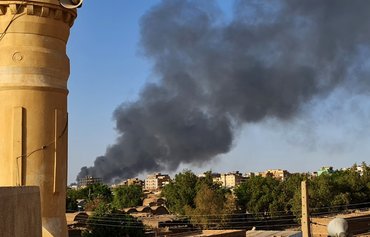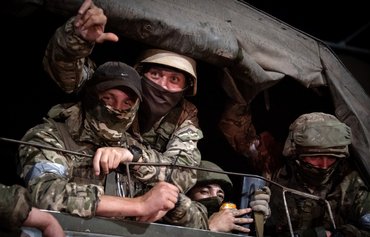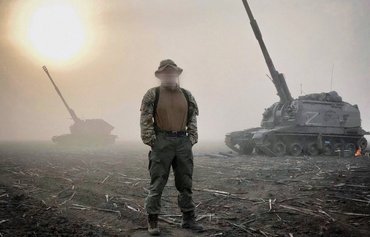NOUAKCHOTT, Mauritania -- Wagner Group mercenaries have been interfering in the burgeoning conflict in Sudan, where there have been rumours they are supporting one of the two sides, say many Sudanese.
The conflict erupted earlier this month between two formerly allied generals: Gen. Mohamed Hamdan Dagalo, or Hemedti, who heads the paramilitary Rapid Support Forces (RSF); and military leader Gen. Abdel Fattah al-Burhan.
The two staged a coup in 2021 that brought down the government but have since become embroiled in a power struggle, with al-Burhan serving as the effective head of state and Hemedti seeking to integrate his forces into the army.
The Russian mercenary Wagner Group has been present in Sudan for years but has kept a low profile during recent clashes to preserve its interests in the gold-rich country, AFP reported.
![Russian Foreign Minister Sergey Lavrov gives a news conference in Khartoum on February 9 during an official visit to Sudan. [Ashraf Shazly/AFP]](/cnmi_am/images/2023/04/28/41897-Russian-Foreign-Minister-600_384.jpg)
Russian Foreign Minister Sergey Lavrov gives a news conference in Khartoum on February 9 during an official visit to Sudan. [Ashraf Shazly/AFP]
![People sit in the office of the 'PMC Wagner Centre', associated with Wagner Group founder Yevgeny Prigozhin, during the official opening of the office block in St. Petersburg, Russia, on November 4. [Olga Maltseva/AFP]](/cnmi_am/images/2023/04/28/41898-Wagner-Centre-Russia-600_384.jpg)
People sit in the office of the 'PMC Wagner Centre', associated with Wagner Group founder Yevgeny Prigozhin, during the official opening of the office block in St. Petersburg, Russia, on November 4. [Olga Maltseva/AFP]
Many analysts have suggested that Wagner Group founder Yevgeny Prigozhin is likely waiting to see the outcome of the fighting before choosing a side.
Some scholars, among them Catrina Doxee of the Centre for Strategic and International Studies, say the Wagner Group is "likely to adopt an opportunistic stance in the current conflict".
But others point to signs that the Wagner Group has already chosen a side, with some reports claiming it has provided weapons to Hemedti's RSF.
"The Russian role in prolonging and fuelling the conflict between the military factions is well known to many people familiar with military affairs in Sudan," a Sudanese journalist who asked not to be named told Al-Mashareq.
"Even if Wagner elements are not openly using weapons in support of one of the parties, it is a known fact that they are providing logistical support and field information to the other party," the source said.
"Fears are growing by the day among the Sudanese people over a potential repeat in Sudan of the Libyan or Malian scenario," he said.
In Africa, the Wagner Group targets resource-rich countries for exploitation.
In Mali, Wagner mercenaries are protecting Russia's interests under the guise of fighting terrorism, while plundering that country's wealth. Mali has rich deposits of "gold, uranium, diamonds" and other substances, according to WorldAtlas.
In Libya, the group is supporting military strongman Khalifa Haftar, using the conflict as an opportunity to expand its access to the African continent. Libya has the largest oil reserves in Africa.
Wagner Group mercenaries are also fighting alongside government forces of the Central African Republic (CAR), which has diamonds.
Sudan, meanwhile, has gold.
'Edge of the abyss'
Fighting and air strikes on Friday (April 28) continued to mar a fragile truce in Sudan between the army and the RSF, as Sudanese and foreigners alike scramble to leave the country or seek shelter outside the conflict zone.
The evacuation of international diplomatic missions is proceeding rapidly, in anticipation of any escalation of the fighting, as world leaders call for the violence in Sudan to stop and warn of far-reaching consequences.
US Secretary of State Antony Blinken on Monday expressed his concern -- and that of "a number of other countries" -- about the presence of Wagner Group mercenaries in Sudan.
"We do have deep concern about the engagement of the Prigozhin group, the Wagner Group, in Sudan," Blinken said during a joint news conference in Washington with Kenyan Cabinet Secretary for Foreign and Diaspora Affairs Alfred Mutua.
"It's in so many different countries in Africa -- an element that, when it's engaged, simply brings more death and destruction with it," he said. "And it's very important that we not see its further engagement in Sudan."
"At this particular time, it is not a time to be able to take sides in a war," Mutua said, noting that foreign players were "trying to use Sudan as a playing field".
"We are asking external forces to leave Sudan alone," he said.
Also Monday, United Nations Secretary-General António Guterres warned that the conflict in Sudan could engulf the whole region and beyond.
"The situation continues to worsen," he said. "Since the start of fighting on April 15, hundreds of people have been killed and thousands injured."
"We must all do everything within our power to pull Sudan back from the edge of the abyss," Guterres said.
Wagner's entrenched presence
"The Sudanese people are paying the price today for the mistake committed by the regime of Omar Hassan al-Bashir, when it tasked Wagner elements in 2004 to train the RSF," said Sudanese political analyst Abu al-Nasr al-Hajj.
The al-Bashir regime had ordered the training to improve the force's capabilities to fight the war in Darfur.
"Today we are paying the price for those mistakes, which at the very least can be described as stemming from short-sightedness and seeking cheap gains," al-Hajj told Al-Mashareq.
"The situation today is very complicated," said a well-known journalist for a newspaper affiliated with one of the parties to the conflict, commenting on Russia's involvement in the current conflict in Sudan on condition of anonymity.
"On the surface, we are seeing armed confrontations between the army and the RSF, but under the surface it is a fight between the Islamist group on one side and Hemedti and Wagner elements on the other," she said.
Previous news reports have noted that Wagner Group mercenaries have a strong presence in Sudan as part of the Kremlin's plans to impose Russian hegemony in Africa, pushing westwards from Sudan into the Sahel region.
"Russia's intervention in Mali today and its strong relationship with Burkina Faso are part of a Russian strategy planned years ago," political analyst Bashir Ould Ahmadou told Al-Mashareq.
"Moscow's opportunity is predicated mainly on military coups by military juntas that lack legitimacy, or the occurrence of security chaos, wherein Moscow would present itself as an alternative to Western countries," he said.
It has done this in Mali, he said, where it accuses the West of preventing peoples from determining their own destiny, and seeks to repeat this in more than one country in the Sahel region.
Sudanese gold
Russia is strengthening its relations with strategically located Sudan with an eye on its natural resources, especially its gold mines, analyst Abdelmoneim Abu Idris Ali told AFP.
This comes "as Russia finds itself more and more isolated after its invasion of Ukraine, while Khartoum was losing Western support after the overthrow of Omar al-Bashir's regime in 2019", he said.
Russia supplied weapons to Sudan during al-Bashir's three-decade rule, especially after the UN imposed sanctions on the country in 2005 over the Darfur conflict.
After the army toppled al-Bashir in 2019 following months of protests, ties between Khartoum and Moscow appeared to slacken.
Russia is now looking to establish a base on the Red Sea to give it a portal into central and western Africa, Sudanese researcher Ahmed Adam Hussein told AFP.
The strategic waterway has drawn fresh international interest in recent years for its geopolitical and military significance, with regional and global powers such as Iran and China working to expand their presence and activities in the corridor.

![A truck mounted with a turret belonging to Sudan's Rapid Support Forces paramilitaries is stationed outside the offices of Dar al-Mushaf (African Holy Qur'an Publishing House) in the south of Khartoum on April 17. [AFP]](/cnmi_am/images/2023/04/28/41895-Sudan-RSF-HQ-600_384.jpg)






